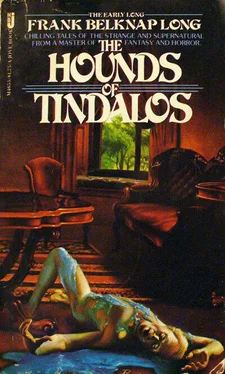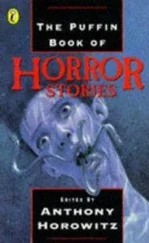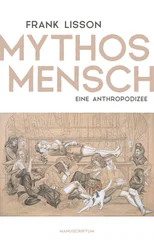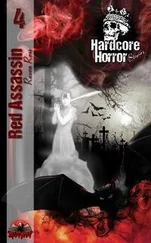The thing dragged me out across the deck, and I remember that I saw the moon through folds upon folds of obscenely bloating jelly. I was buried deep down within fatty, obscure folds that shivered and shook and palpitated in the moonlight.
I no longer felt any desire to protest or to cry out, and the thought of Oscar and a possible rescue did not fill me with elation. I began to experience sensations of pleasure. How am I to describe them? A peculiar warmth pulsed through me; my limbs quivered with a weird expectancy. I saw through the folds of animated jelly a great reddish sucker, or disk, lined with silver teeth. I saw it descend rapidly through the folds. It fastened upon my chest, and a momentary revulsion made me claw ludicrously at the nauseous tissues surrounding me. There was a kind of cruelty in the refusal of the flimsy stuff to offer any resistance. One could go on that way for ever, clawing and tearing at the fatty folds, and feeling them give, and yet knowing that nothing could possibly come of it. For one thing, it was utterly impossible to get a hold on the stuff, to get it between your hands and squeeze it. It simply flipped away from you and then it rushed back and solidified. It could condense and dilate at will.
My feeling of horror and antipathy disappeared, and a new tide of exaltation, of warmth, of vigour, surged over me. I could have wept or screamed with ecstasy.
I knew that the monster was actually drawing up my blood through its fumbling, convulsive suckers. I knew that in a moment I should be drained as dry as a grilled carbonado, but I actually welcomed my inevitable dissolution. I made no effort to conceal my glee. I was frankly hilarious, although it seemed unjust to me that Oscar should have to explain to the men. Poor Oscar! He tied up the loosened ends of things, smoothed over vulgar and disagreeable realities, made the raw, ungarnished facts almost acceptable, almost romantic. He was a precious stoic, and gloriously self-reliant. That I knew, and I pitied him. I distinctly recalled my last conversation with him. He was slouching along the docks, with his hands in his pockets, and a cigarette between his teeth. “Oscar,” I said, “I didn’t really suffer when that thing fastened upon me! I didn’t, really. I enjoyed it!” He scowled, and scratched his ridiculous fringe of hair. “Then I saved you from yourself!” he cried. His eyes blazed, and I saw that he wanted to knock me down. That was the last I saw of Oscar. He faded into the shadows after that, but had I kept him with me I might have been wiser.
That jelly about me seemed to increase in volume. It must have been three feet thick about my head, and I am sure that I saw the moon and the swaying mastheads through a prism of varying colours. Waves of blue and scarlet and purple would pass before my eyes, and a taste of salt came into my mouth. For a moment I thought, not without a certain resentment and hurt pride, that the thing had really absorbed me, that I was a portion and parcel of that quivering, gelatinous mass — and then I saw Oscar!
I saw him looming above my obscene prison-house with a lighted torch in his hand. The torch, viewed through the magnifying folds of jelly, was a thing of flawless beauty. The flames shot out and appeared to cover the entire deck, and to go flying up against the darkness. The cordage and the luminous rails seemed afire, and a red and ravening serpent lengthened parallel with the scuppers. I saw Oscar clearly, and I saw the great spiral of smoke that streamed from the tails of flame, and I saw the swaying, encrimsoned masts, and the black sinister opening in the forecastle. The darkness seemed to part to let Oscar through with his torch and his stoicism. He swayed in the darkness above me, that silent, quixotic man, and I knew that Oscar could be trusted to put an end to things. I had no clear idea of what Oscar would do, but I knew that he would make some sort of brilliant and satisfying end.
I was not disappointed, and when I saw Oscar bend and touch the folds of jelly with his great, flaming torch I wanted to sing or shout. The folds quivered, and changed colour. A maddening kaleidoscope of colour passed before my eyes — flaming scarlet and yellow and silver and green and gold. The sucker released its hold upon my chest and shot upward through the voluminous folds. A terrific stench assailed my nostrils. The odour was unbearable: I threw out my arms and fought savagely to break through to reach the air and fight and Oscar.
Then I felt the heat of Oscar’s torch upon my cheek, and I knew that the tissue about me was falling away and burning to shreds. I saw that it was dissolving and I felt it hotly trickling down my knees and arms and thighs. I closed my lips tight to keep from swallowing large quantities of the nauseous fluid, and I turned my face to the deck to protect my eyes from the falling fragments of sizzling tissue. The creature was literally being burnt alive, and in my heart of hearts I pitied it!
When Oscar at length helped me to my feet I saw the last of the thing disappear over the side. Its arms were horribly charred and the suckers were gone, and I caught a momentary glimpse of dangling, frayed ends and reddish knobs and bulging protuberances. Then we heard a splash and a queer gurgling sound. We looked at the deck and saw that it was covered with greenish oil, and here and there great solid chunks of burnt tissue swam in the hideous porridge. Oscar bent and picked up one of the fragments. He turned it right side up in his hand, so that the moonlight fell upon it. It contained in its five-inch expanse a four-inch sucker. And the sucker opened and closed while Oscar held the thing in his hand. It fell from Oscar’s hand like a leaden weight and bounded into the air. Oscar kicked it overboard and looked at me. I looked away towards the black topsail mast-head.
The Man with a Thousand Legs
1. Statement of Horace Randall, Psychoanalyst
SOMEONE rapped loudly on the door of my bedroom. It was past midnight but I had been unable to sleep and I welcomed the disturbance.
“Who’s there?” I asked.
“A young man what insists on being admitted, sir,” replied the raucous voice of my housekeeper. “A young man — and very thin and pale he is, sir— what says he’s business what won’t wait. ‘He’s in bed,’ I says, but then he says as how you’re the only doctor what can help him now. He says as how he hasn’t slept or ate for a week, and he ain’t nothing but a boy, sir!”
“Tell him he can come in,” I replied as I slid into my dressing gown and reached for a cigar.
The door opened to admit a thin shaft of light and a young man so incredibly emaciated that I stared at him in horror. He was six feet tall and extremely broad-shouldered, but I don’t think he weighed one hundred pounds. As he approached me he staggered and leaned against the wall for support. His eyes fairly blazed. It was obvious that some tremendous idea swayed him. I gently indicated a chair and he collapsed into it.
For a moment he sat and surveyed me. When I offered him a cigar he brushed it aside with a gesture of contempt.
“Why should I poison my body with such things?” he snapped. “Tobacco is for weaklings and children.”
I studied him curiously. He was apparently an extraordinary young man. His forehead was high and broad, his nose was curved like a scimitar, and his lips were so tightly compressed that only a thin line indicated his mouth.
I waited for him to speak, but silence enveloped him like a rubber jacket. “I shall have to break the ice somehow.” I reflected; and then suddenly I heard myself asking: “You have something to tell me — some confession, perhaps, that you wish to make to me?”
My question aroused him. His shoulders jerked, and he leaned forward, gripping both arms of his chair. “I have been robbed of my birthright,” he said. “I am a man of genius, and once, for a brief moment, I had power— tremendous power. Once I projected my personality before vast multitudes of people, and every word that I uttered increased my fame and flattered my vanity.”
Читать дальше












